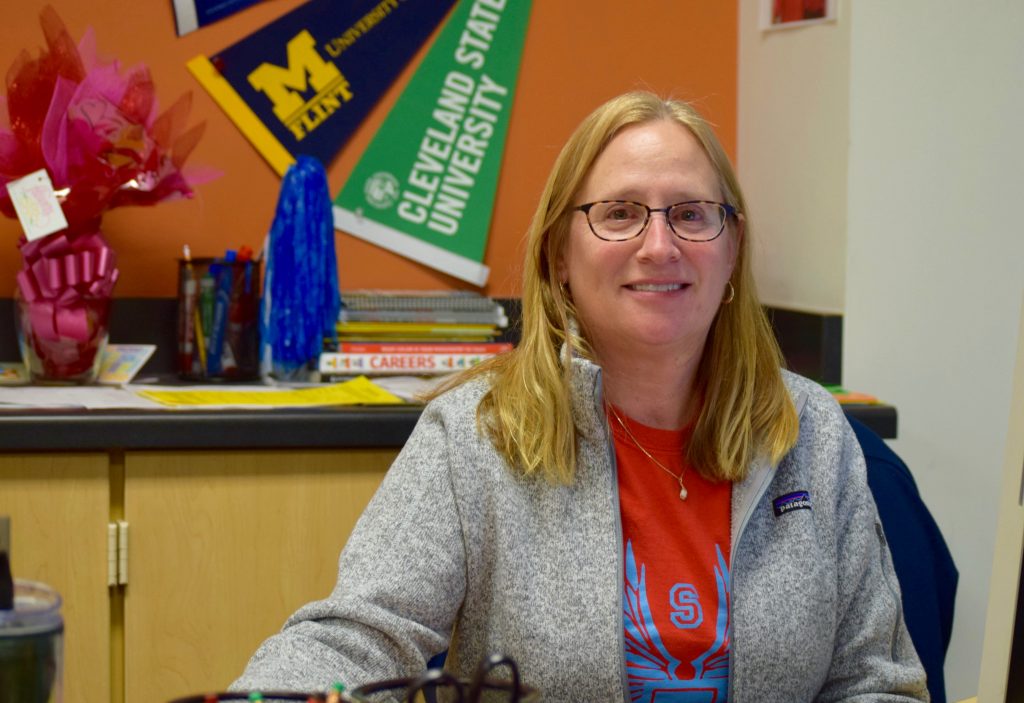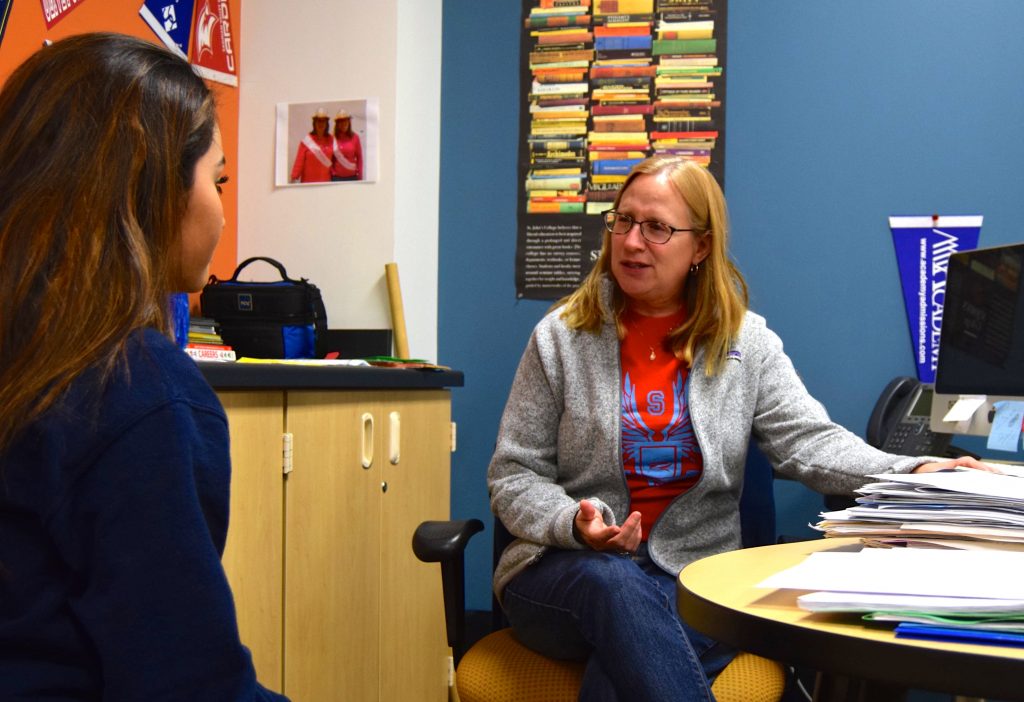

Profile and photos by Jo Mathis/AAPS District News Editor
Cheryl Haller grew up near the beaches of Lake Michigan in Milwaukee, Wisconsin. She earned a bachelor’s degree in speech communications & marketing from the University of Wisconsin-La Crosse and teacher certification from Notre Dame College of Ohio.
Initially, Haller worked as a recruiter for healthcare professionals, and then for a direct marketing firm representing Amoco Oil, Hewlett-Packard and Johnson Controls. She met her husband, John, in Milwaukee, and due to his work with Ford Motor Co, relocated twice, first to Medina, Ohio for 13 years, and then to the Ann Arbor area for the last 12 years. During this time, they’ve raised three children, Samantha, Carly, and Dylan.
As a result of positive interactions with teens as a church youth leader, Haller chose to go into education in her late 30’s. She taught 11th and 12th grades at Medina County Joint Vocational High School, teaching language arts for four years for at-risk students, and American literature, speech, and journalism for a year. After Haller’s family relocated to the Ann Arbor area in 2004, she accepted a job as a community assistant at Pioneer High School. Still motivated to teach, she tutored students after school in math, English and social studies.
When a peer working at Skyline High School encouraged her to look into working there, Haller looked for more opportunities to use her teaching skills and expertise working with challenging students. She continued to work as a community assistant for several more years at Skyline and tutored students after school.
Haller became Skyline’s college and career advisor in February of 2016. Because she enjoys being a student as well as an educator, she continues to engage in assorted graduate coursework and classes.
What was always written on your report card in grade school? “Gets along well with others, a pleasure to have in class.”

What do you remember most about middle school? About high school? I remember middle school being a place to try out new things, to explore assorted clubs and activities. Admittedly, I found myself not wanting to be in the advanced math class because my friends weren’t in it, but I changed my mind when “cool” Pat G. came into the class with his long, golden locks and groovy striped bell bottoms. I was hooked.
The most important thing I learned from high school was social responsibility and the benefit of a strong sense of community. It was pretty progressive for its time, and even then, I was taught to embrace diversity. There were only about 200 students in my graduating class. I still periodically attend my high school reunions and stay in contact with friends from high school via Facebook.
In your ten years with AAPS, what’s the most important thing you’ve learned about working with teenagers? Students can tell if you truly care about them, and enjoy your work. Many people think students would rather spend time with technology than with people, but I disagree. Teenagers yearn for attention, relational contact, and engagement. They just need to feel safe and free to be themselves. So many teenagers have performance anxiety as a result of academic and social expectations, that it is refreshing for them to just chill, and share their goals, dreams, thoughts and ideas with staff.
Have students goals changed during your years with the district? Not really. All students want to be successful personally and professionally, even those students who try to sabotage their efforts along the way. Students just need to establish realistic goals that are reasonably attainable, and that offer some flexibility along the way. As human beings, we evolve and grow, so no student should ever feel “finished,” or settle for achieving a few conventional goals. And they should never feel that they aren’t good enough.
What do you know about teenagers that the rest of us don’t? Many of you know this, but many do not care to admit that we are part of the problem. As educators and parents, we have put so many expectations on our students, to the point that it is unhealthy. We are seeing a record number of brilliant kids under so much pressure and stress to perform, get the best grades, take more rigorous classes, do more community service, and get into the best colleges. The competition is fierce. I do not remember this kind of pressure when I prepared for college. It is not unusual for high-end colleges to expect students to have six or more AP classes on their transcript, and to be doing something extraordinarily profound by the age of seventeen. In my opinion, this places too many unrealistic expectations on a high volume of our students. Kids need to be kids; it’s crucial to their human development.
Describe an average workday. Ha! Busy! Although it did not start this way. Students had to buy into what we could offer them as a college and career resource. This year, I have worked with close to 300 seniors and 80 juniors so far. Many of these students I see on several occasions. We create an individual file for each student who visits, and then track his or her plans and progress. Most of my official work day is spent with students because I see this as the priority. Students are my constituents, not the resources. I also work closely with our counselors, case managers, and some parents, and spend time on the phone with admissions directors, community businesses, and college reps. In addition to these duties, I give building tours to potential incoming students and their families, participate in SAT Coaching, and act as the Skyline Women of Tomorrow Advisor, providing individual support and group learning experiences to about twenty high school girls. My days go by fast.
Do all AAPS high schools have a college and career advisor? Yes, and students are really starting to understand the value of this service. There is so much to learn and understand about the college and career process, and school advisors provide a wealth of information. Senior students have commented that they wish it were a class because there is so much for them to learn and do. For most students, this is their first venture filling out forms independently, creating a resume, and interacting with business professionals such as admissions officers. Students need direction and guidance, and they need advisory support without judgment. The advisor can provide a foundation for changing a student’s attitude and direction in how they approach high school and what it can do for them.
How do you feel about the way students are handling their post-high school plans and continued education? I’m pleased with the direction students are moving in regard to taking ownership of their future. Students are actively engaged at The Cube and use the space to research college and career information, job opportunities, and mostly, to execute the college application process. This includes standardized test taking preparation, resume writing, essay proofreading, filling out applications, financial aid and scholarship forms, college interviews, participating in college visits, and how to best market themselves to potential colleges, universities, trade schools, and employers.
Favorite Websites: Prep Scholars—a great reality check for students exploring college options. Occupational Outlook Handbook.
Apps you can’t live without: Google Maps.
Three favorite devices:
- Computer: We recently set up 4 computers in the Cube and they are used consistently for FAFSA, college apps, and research. It is not unusual to see all four in use. And the world of Google Chrome makes research so incredibly easy.
- Phone: I’m a texter. It’s so fast and convenient, and students respond immediately.
- My brain: We spend a lot of time strategizing, problem-solving, and thinking outside of the box. I also still like doing calculations in my head or on paper; it’s fun. My husband nicknamed me T.I. for Texas Instruments, not the rapper. I like to share this “device” with students, to help them see how they can improve their grades and GPA, calculate a student loan or do a cost analysis for given colleges and majors.
How do you stay organized? As I see more students, I find the file system she created for individual students extremely helpful. Students take ownership of their file, but they know I am working their file right alongside them. It is easy to retrieve info for scholarship nominees, potential candidates for specific colleges and careers, and I and others can fill their file with pertinent notes, mail, brochures, and copies of test results, etc. Students will also be assisting me with organizing The Cube website.
What is unique about the Skyline community? There is no “ego” or pretension here. These are some of the most hard-working, genuine, and caring people I know. And they generously give their time and talents to our students. I am honored to be associated with Skyline.
What is the most rewarding part of your job? Being able to be a part of students’ college acceptance experience. Students love to run into The Cube and share their news, and we celebrate all of their achievements. Seeing first-generation and emerging students win their first college acceptance is just as rewarding as the student who is admitted to the University of Michigan. Seeing all students bring together their life-long efforts and have a workable, foreseeable plan for their future is satisfying.
What has surprised you most about the profession? Originally, I thought the college and career center was best suited for juniors and seniors but I’ve since learned that timeframe might be too late. The achievement gap can be reduced substantially if emerging students can see the literal relationship between their progress and their increased options.
If you could change one thing about public education, what would it be? Fund it.
What would you tell a college student considering a career in education? As I tell all students, try to find something to do that does not feel laborious. Finding a natural comfort and passion for something helps curb the frustrations that come along with any career, including education.

Be the first to comment